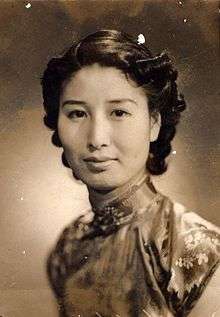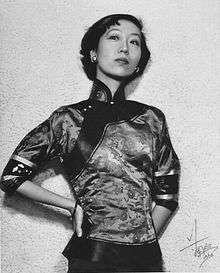Lust, Caution (novella)
| Author | Eileen Chang |
|---|---|
| Original title | 色,戒 |
| Translator | Julia Lovell |
| Language | Chinese |
Publication date | 1979 |
Published in English | 2007 |
Lust, Caution (Chinese: 色,戒; pinyin: Sè, Jiè) is a novella by the Chinese writer Eileen Chang, first published in 1979. It is set in Shanghai, Republic of China during the Second Sino-Japanese War. Reportedly, the short story "took Chang more than two decades to complete".[1] The 2007 film of the same name by Ang Lee was based on this novel. The character of Chia-chih is generally believed to be based on the wartime spy Zheng Pingru.[2]
Working title
In 2008, Hong Kong magazine Muse released an unpublished English manuscript by Eileen Chang, which was clearly an earlier draft of Lust, Caution.[3] The original title typewritten in English, was The Spyring or Ch'ing Kê! Ch'ing Kê! The manuscript was dated to the 1950s and was bequeathed to Chinese-American translator Roland Soong upon Chang's death. Soong decided to release the manuscript when the 2007 film adaptation hit the cinemas.[4]
Plot summary

During the Japanese occupation of China, Wang Chia-chih (Wang Jiazhi) along with her former student drama troupe take on a dangerous mission to disrupt the Wang Jingwei regime. The group plans to assassinate Mr. Yee (Yi), a co-collaborator of Wang Jingwei. Chia-chih is selected to disguise as the wife of Mr. Mai, a Hong Kong businessman. Her task is to seduce Mr. Yee and facilitate the ambush.
Initially, the radical student group plans to assassinate Mr. Yee during his stay in Hong Kong; however, the Yees unexpectedly leave for Mainland China. The group is disbanded due to a lack of financial funds and the low chance in which Mr. Yee will be close to their proximity. During this period, female student friends of Chia-chih denounce her as a whore. The mission resumes after a revolutionary offers to sponsor its continuation in Shanghai.
In Shanghai, Chia-chih becomes a part of Mrs. Yee's regular mahjong group. She quickly enters into a secret affair with Mr. Yee. Throughout their relationship, Chia-chih internally struggles between her personal affection for Mr. Yee and her task as a spy. On the day during which the radicals plan to assassinate him, Mr. Yee offers to buy Chia-chih a rare diamond ring when they visit the jeweler to replace a gem from one of her earrings. As they are waiting for the jeweler to prepare a receipt, Chia-chih realizes that Mr. Yee's feelings for her are genuine. At the last minute, she simply tells him to run as a way of warning him of the impending assassination. He successfully flees.
Chia-chih and the rest of the drama troupe are executed on the basis of the information Mr. Yee provides. After the execution, Mr. Yee realizes his love for Chia-chih. Nevertheless, he finds comfort in the thought that the executions helped to prevent rumors of his affair from spreading. The novella ends with him leaving the room filled with socializing Tai tais.
Characters
- Wang Chia-chih, a revolutionary student spy posing as the wife of Mr. Mai, a Hong Kong businessman. Her tasks are to befriend Yee Tai Tai and seduce Mr. Yee in order to make his assassination possible.
- Mr. Yee, the husband of Yee Tai Tai and advisor to Wang Ching-wei. Mr. Yee is the object of a political assassination plot. He is seduced by Chia-chih.
- Mr. Mai, a failed Hong Kong businessman. Mr. Mai is the secret identity of Ou-yang Ling-wen, a member of the student drama troupe.
- Yee Tai Tai (Mrs. Yee), a cousin of the Mai family. She is from the same region as one of Wang Ching-wei's aides, from whom she extracts valuable information about Wang's inner circle.
- Kuang Yu Min, cast as a cousin of the Mai family. From the same region as one of Wang Ching-wei's aides from which she extracts valuable information about Wang's inner circle.
- Wang Ching-wei, based on the historical figure Wang Jingwei.
- Huang Lei, the wealthiest of the student drama troupe. He serves as the troupe’s chauffeur. He initially funds their mission until his father financially cuts him off.
- Wu, an underground revolutionary who is based in Shanghai. After knowing of the assassination plot, he offers financial support for its continuation.
- Liang Jun-Sheng, the only member of the student troupe with experience inside a brothel. He is tasked with training Chia-chih to become a seductress.
- The Wives, the entourage of Yee Tai Tai.
Themes

Feminism
Feminism is a prominent theme in Lust, Caution. In the story, Chia-chih, a key player in the assassination plot of Mr. Yee, utilizes her sexuality in luring him. Throughout Chinese history, women have often been used as "honey traps" by politicians. In ancient China, two famous beauties, Xi Shi and Diaochan, used beauty stratagems to help overcome political enemies.[5] Chia-chih's refusal to act as a pawn in the masculine political conspiracy is a liberation from the Chinese male prerogative culture.[6]
Individualism
Chia-chih's preference for love over politics serves as a defiance of patriotism and nationalism. In Julia Lovell’s afterword, "Chang created for the first time a heroine directly swept up in the radical, patriotic politics of the 1940s, charting her exploitation in the name of nationalism and her impulsive abandonment of the cause for an illusory love."[7] In the story, Chang asserts that individualism should be prioritized over nationalism. This is a radical notion in comparison to the conventional belief that individuals are subordinate to the nation.[6]
English translation
Lust, Caution was first translated into English by Julia Lovell and published in 2007.[8]
Adaptations
In 2009, an abridged version of Lust, Caution was read by Greg Wise as part of a series of online Jackanory-style online films for The Carte Noire Readers.
References
- ↑ Wilonsky, Robert (1 October 2007). "The Spy Who Shagged Yee". City Pages. Archived from the original on 20 April 2009. Retrieved 6 December 2009.
... Writing in the afterword to a recently republished version of the 54-page story, which took Chang more than two decades to complete, ...
- ↑ Thompson, Zoë Brigley (2016). "Beyond Symbolic Rape: The Insidious Trauma of Conquest in Marguerite Duras's The Lover and Eileen Chang's "Lust, Caution"". Feminist Formations. 28 (3): 1–26. doi:10.1353/ff.2016.0041. ISSN 2151-7371 – via Project MUSE. (Subscription required (help)).
- ↑ Peng Hsiao-yen, Whitney Crothers Dilley (2014). From Eileen Chang to Ang Lee: Lust/Caution. Academia Sinica on East Asia. Peng Hsiao-yen, Whitney Crothers Dilley. Routledge. pp. 1–2 and footnote. ISBN 9781317911036.
- ↑ "The Spyring and 'Lust, Caution'". ESWN Culture Blog (in Chinese and English). EastSouthWestNorth. 2 March 2008. Retrieved 6 December 2015.
- ↑ Ying, Hu (December 1993). "Angling with Beauty: Two Stories of Women as Narrative Bait in Sanguozhi yanyi". Chinese Literature: Essays, Articles, Reviews (CLEAR). 15: 99–112. doi:10.2307/495375. JSTOR 495375.
- 1 2 Yao, Sijia (2017). "Female Desire: Defiant Text and Intercultural Context in Works by D.H. Lawrence and Eileen Chang". Rocky Mountain Review of Language and Literature. 71 (2): 195–212. ISSN 1948-2833 – via Project MUSE. (Subscription required (help)).
- ↑ Chang, Eileen (2007) [First published in 1979]. Lovell, Julia, ed. Lust, Caution and Other Stories. Translated by Lovell, Julia. London: Penguin. Editor’s Afterword (pp. 153–159). ISBN 978-0-141-03438-6.
- ↑ Zhang, Ailing (4 September 2007) [First published in 1979]. Lust, caution: the story. Translated by Lovell, Julia. Afterword by Ang Lee, with a special essay by James Schamus. New York: Anchor Books. ISBN 978-0-307-38744-8.